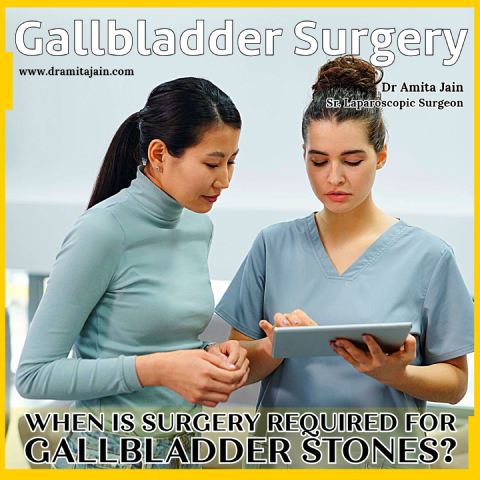Insights Shared by India’s Leading Gallbladder Surgeon Dr Amita Jain
Many individuals find themselves at a crossroads, wondering whether surgery is the answer or if there’s a less invasive route to consider. While the idea of surgery may send shivers down many spines, it’s crucial to understand that the decision to go under the knife is a personal one, shaped by various factors.
Let us understand when you need cholecystectomy or gallbladder removal surgery in the case of gallstones from Dr Amita Jain who is an eminent gallbladder specialist and surgeon in the field of laparoscopic surgery.
What is a gallbladder and what are gallstones?
The gallbladder, a pear-shaped organ situated beneath the liver, serves as a storage reservoir for bile—a fluid produced in the liver which is essential for fat digestion. Bile is discharged into the small intestine via the common bile duct, a tube connecting the gallbladder and liver.
Gallstones (biliary calculi) are hard, pebble-like structures that can be as tiny as a grain of sand or as large as a golf ball. They form when excess cholesterol or salt solidifies in bile. If they move from the gallbladder and obstruct bile flow, it leads to sudden abdominal pain—a gallbladder attack. Blocked bile ducts trigger this condition, causing discomfort that requires immediate medical attention.
Reason for Gallstone Formation
Several factors can increase the risk of developing gallstones. Some factors like age, family history, ethnicity, etc are beyond our control. Other risk factors include Lack of exercise, obesity, rapid weight loss, high triglyceride levels, diabetes, bile duct problems, and liver disease.
When is Gallbladder Removal Surgery Necessary?
Patients with few and small-sized gallstones can be asymptomatic. Surgery may not be necessary in such cases as patients may not even know about their existence. However, gallbladder removal surgery or cholecystectomy is conducted only when:
1. Biliary Colic: Biliary colic, or symptomatic cholelithiasis, is abdominal pain caused by gallstone obstruction in the cystic or common bile duct. Triggered by fatty meals, the pain is a steady, intense ache that radiates from the middle to the right upper abdomen and may extend to the shoulder.
Unlike colicky pain, biliary colic persists and prompts emergency room visits. Surgical treatment, often laparoscopic gallbladder removal, is the primary approach for this condition.
2. Cholecystitis: When a gallstone blocks the neck of the gallbladder, it can lead to acute cholecystitis, causing intense upper abdominal pain radiating to the shoulder blade for more than 5 hours, accompanied by a high temperature and rapid heartbeat.
In some cases, jaundice may occur in approximately 10% of individuals with acute cholecystitis, indicating a potential blockage of the bile duct and infection in the gallbladder.
3. Jaundice: When a gallstone obstructs the bile duct to the bowel, bile enters the bloodstream instead of the digestive system. This causes yellowing of the skin and eyes, dark brown urine, pale stools, and itching. Occasionally, the stone passes naturally; if not, surgical removal is necessary to alleviate symptoms and prevent complications.
4. Acute Cholangitis: When bile ducts are blocked, infection can occur, leading to acute cholangitis. Symptoms include upper abdominal pain, shoulder blade pain, high temperature, jaundice, chills, confusion, itchy skin, and feeling unwell.
Antibiotics treat the infection, while endoscopic retrograde cholangiopancreatography (ERCP) helps drain bile. This inflammation results from gallstone blockage, causing pain, fever, jaundice, and shaking (rigors). Swift treatment addresses infection and promotes bile flow for recovery.
5. Pancreatitis: When a gallstone blocks the opening (duct) of the pancreas, it becomes inflamed. Pancreatic enzymes leak, causing severe upper abdominal pain that worsens steadily. The ache may extend to the back, intensifying post-meals. Symptoms include nausea, vomiting, diarrhoea, appetite loss, abdominal tenderness, and occasionally, jaundice.
6 Gallbladder Cancer: Though rare, yet individuals with a history of gallstones face an elevated risk of gallbladder cancer. Symptoms include abdominal pain, fever, and jaundice.
7. Gallstone ileus is a rare and severe complication where a fistula near the gallbladder allows gallstones to obstruct the bowel, leading to symptoms like abdominal pain, vomiting, abdominal swelling, and constipation.
Swift medical intervention is crucial to prevent bowel rupture, internal bleeding, and infection. Surgical removal of the gallstone is typically necessary to unblock the bowel.
Although certain medications do help dissolve the smaller gallstones, it is advisable to consult a doctor to understand the severity of the condition. Now that you understand the potential complications and symptoms associated with gallstones, prompt medical attention is crucial.

Dr Amita Jain is one of India’s most distinguished and experienced senior surgeons who has conducted more than 1,00,000 successful surgeries, and has covered a wide spectrum of general and minimally invasive procedures. Dr Amita Jain is refered as the pioneer surgeon in the fields of Gallbladder stone removal surgery, appendix removal surgery, hernia repair surgery, Pilonidal Sinus treatments, varicose vein and piles surgery, fistula surgery and fissure surgeries.
With an outstanding career spanning over 29 years, Dr Amita Jain has earned her place among the top General and Laparoscopic surgeons in Delhi and India, known for her precision, compassion, and consistent surgical excellence. She was the Professor of Surgery at the Army College of Medical Sciences and Base Hospital, Delhi Cantt. In 1994, she was commissioned as a surgeon under the United Nations Mission in Congo.
Dr Amita Jain currently serves as the Head of Department and Senior Consultant for General, Laparoscopic and Trauma Surgery at Artemis Lite Hospital, Rosewalk – Luxury Maternity Hospital in Delhi (Panchsheel Park, Delhi) and Rainbow Children Hospitals (Malviya Nagar, Delhi).
